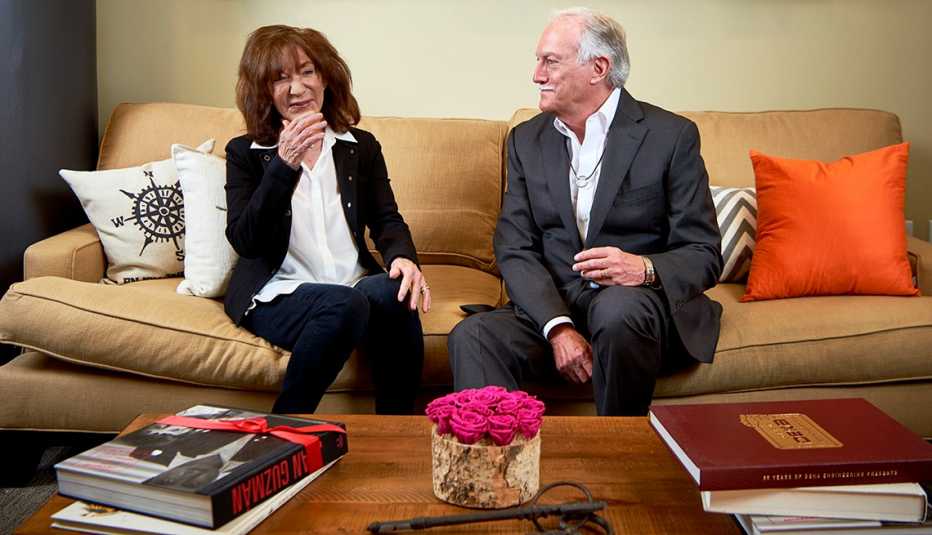Staying Fit
For most of my 20s, I kept two phone lines. One number was for everybody, except one person; the other was for my mother.
This was in the 1980s, before caller ID. I needed to know, with absolute certainty, that I could pick up my regular phone and not end up in a two-hour conversation about whether I was making enough money, or if I was dating, or if I had heard from that nice boy who had dumped me or whether I knew there was another serial killer in my neighborhood. So much to talk about! Most of these discussions played to my deepest anxieties that I was never going to make a living as a writer and never find someone to love me — though maybe none of that mattered because I would end up chopped up into little bits by the serial killer (who probably never called his mother, either). My mother wasn't trying to make me hate her. She loved me — and love makes people do strange things.


AARP Membership— $12 for your first year when you sign up for Automatic Renewal
Get instant access to members-only products and hundreds of discounts, a free second membership, and a subscription to AARP the Magazine.
Now that I have two grown sons, I see things all too clearly from my mother's perspective: the endless anxiety, the near certainty that my kids are on the brink of making life decisions they will not be able to walk back, the absolute certainty they won't wear earmuffs when everyone should wear earmuffs. But now there is caller ID, unfortunately, so my sons can tell when it's me calling and not pick up.
Before I reach the point of registering myself as a “private caller,” to improve the odds they'll answer, I'm trying to get a grip. And you should, too. There are so many ways to push away your adult kids. Here's a small sampling of what not to do.
Invade their lives
Want your kid to avoid you on a daily basis? Make sure you have no idea where you end and he begins.
Susie Jo Levin's mother was very eager for her to get married. Very. Eventually, Levin, 58, a writer in northern New Jersey, met a lovely guy and got engaged, but the relationship faltered. “Our breakup was sad but amicable. I tell my mother over the Thanksgiving holiday. She has a meltdown. She gathers every speck of childhood memorabilia in her house and stuffs all 10 boxes into my car. Why? I don't know. She was just furious. But this is what every newly dis-engaged woman needs in a 250-square-foot apartment: a vintage Easy-Bake Oven, letters from camp and old prom dresses.” Somehow, says Levin, “this was her breakup” — caused by her daughter's crappy choices.
Fast-forward a few years, when Levin met the man she ultimately did marry, and the ex-boyfriend (now a friend) was at their wedding. Her mother turned to the ex and said, “See, this could have been your wedding."
Jane Greer, a psychotherapist and author of What About Me? Stop Selfishness from Ruining Your Relationship, has counseled many parents and their adult children. This lack of boundaries, she observes, is the children's No. 1 complaint. It's a reaction to the parent “who takes your successes and failures way too personally — who wants to know what you're doing, where you're going, how much it costs,” Greer says.
"And the kid is thinking, What part of ‘on my own’ don't you understand?"
Give conditionally
You lend the kids money, then complain about their spending. You give the grandkids Amazon gift cards but tell them they're only for books. “My husband's mother gave us money for a down payment on the house, which meant, as far as she was concerned, she got the key,” says one friend. “Actually, that was fine. What wasn't fine was that she never, ever knocked before she used it."
First, gifts are wonderful, but they do not give you an all-access pass to your adult child's life. And second, a gift with strings attached isn't really a gift at all.
For more home & family advice, get our monthly Lifestyle newsletter.
Be too meek
The “I didn't want to trouble you” sentiment seems so kind and considerate, doesn't it? But very often, your desire not to be a nuisance ends up causing a problem that is far bigger than if you had spoken up.



































































